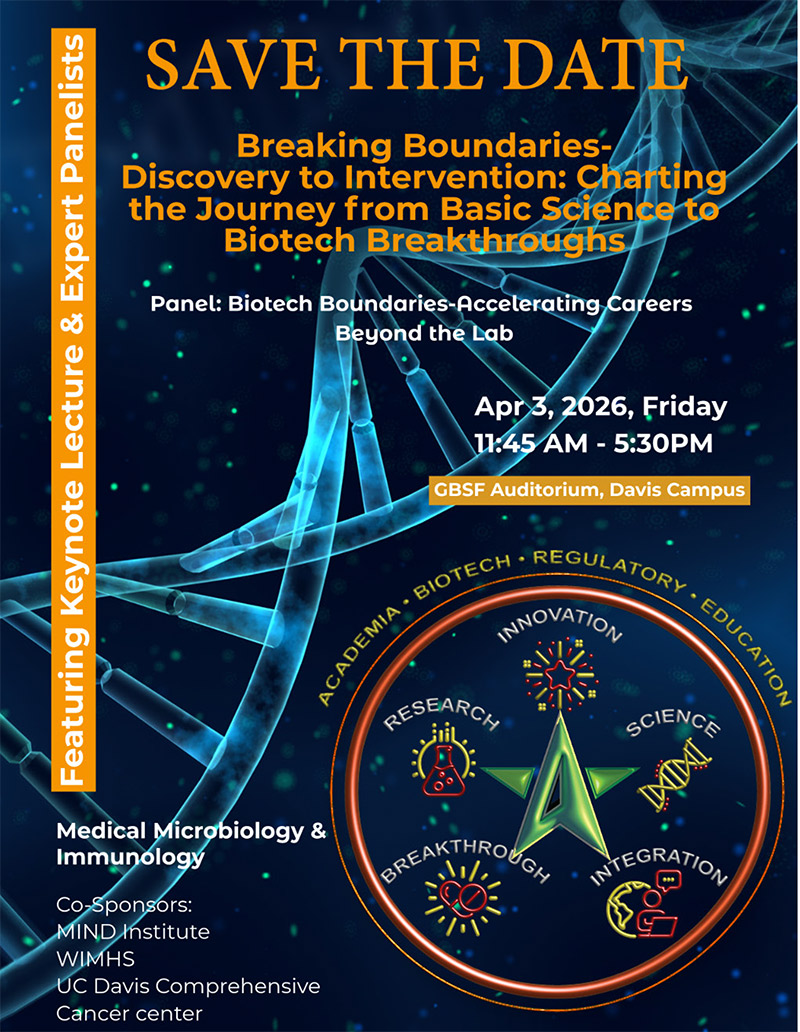Maria Mudryj, Ph.D.

Professor
Tupper Hall
Room 3147
Davis Campus
530-754-6090
mmudryj@health.ucdavis.edu
Prostate cancer, Bladder Cancer, Androgen Receptor, Retinoblastoma (RB) E2F Transcription Factors
Our laboratory is studying urological malignancies, which are commonly diagnosed and a leading cause of death due to cancer in Western civilization.
Early prostate cancers require androgen to survive and proliferate; this dependence is exploited in treatment for disseminated disease. Therefore, androgen ablation is the first line of therapeutic intervention. Although these regimens are initially effective, tumors ultimately recur due to reactivation of androgen receptor (AR) signaling, causing treatment failure and patient morbidity. Despite the importance of understanding androgen action in the prostate, little is understood about the mechanisms underlying androgen dependence, and the means by which the androgen requirement is bypassed in relapsed tumors.
Bladder cancer shows a striking gender disparity where men are three times more likely to develop the disease than woman. Development of treatments for this disease has lagged and there have been few advances in the field. The AR has a role in this malignancy as well, although molecular mechanisms underlying this AR dependence are currently unknown.
My lab is dedicated to delineating the molecular mechanisms that govern urological tumor growth to identify new targets and strategies to eliminate these diseases.
Maria Mudryj and Paramita M. Ghosh. "Transcriptional-translational conflict, a novel exploitable tumor suppressive mechanism". Signal Transduction and Targeted Therapies 2023 Sep 25;8(1):361. doi: 10.1038/s41392-023-01591-5. PMID: 37743426.
Kimberly Katleba, Paramita Ghosh, Maria Mudryj. "Beyond Prostate Cancer: Androgen Receptor Splice Variant Expression in Multiple Malignancies", Non-cancer Pathologies, and Development. Biomedicines, 2023 11(8), 2215.
Christopher A. Lucchesi, Demitria M. Vasilatis, Saisamkalpa Mantrala, Thenappan M. Chandrasekar, Maria Mudryj, and Paramita M Ghosh. "Pesticides and Bladder Cancer: Mechanisms leading to Anti-cancer Drug Chemoresistance and New Chemosensitization Strategies". International Journal of Molecular Sciences 2023 Jul 13;24(14):11395. doi: 10.3390/ijms241411395.
Maitreyee Jathal, Salma Siddiqui, Demitria Vasilatis, Blythe P. Durbin Johnson, Benjamin A. Mooso, Leandro S. D’Abronzo, Neelu Batra, Maria Mudryj, Paramita Ghosh. "Androgen receptor transcriptional activity is required for heregulin-1β-mediated nuclear localization of the HER3/ErbB3 receptor tyrosine kinase". Journal of Biological Chemistry, 2023 Jun 26:104973. doi: 10.1016/j.jbc.2023.104973.
Thomas M. Steele, Maria Malvina Tsamouri, Salma Siddiqui, Benjamin A. Mooso, Blythe P. Durbin-Johnson, Ai-Hong Ma, Nazila Hejazi, Mamta Parikh, Maria Mudryj, Chong- Xian Pan, Paramita M. Ghosh. "Cisplatin-induced Increase in Heregulin 1 and its attenuation by the monoclonal ErbB3 antibody Seribantumab in Bladder Cancer". Scientific Reports 2023 Jun 14;13(1):9617. doi: 10.1038/s41598-023-36774-1. PMID: 37316561.
Kimberley D. Katleba, Maria Malvina Tsamouri, Maitreyee Jathal, Han Bit Baek, Clifford G. Tepper, Gino Cortopassi, Paramita M. Ghosh, Maria Mudryj. "Androgen receptor-dependent regulation of metabolism in high grade bladder cancer cells". Scientific Reports, 2023 Jan 31;13(1):1762. doi: 10.1038/s41598-023-28692-z. PMID: 36720985.
Maria Malvina Tsamouri, Thomas M. Steele, Maria Mudryj, Michael Kent, Paramita M. Ghosh. "Comparative cancer cell signaling in muscle-invasive urothelial carcinoma of the bladder in dogs and humans". Biomedicines, 2021 Oct 15;8(10):422. doi: 0.3390/biomedicines8100422.
Elisabeth A. Messner, Thomas M. Steele, Maria Malvina Tsamouri, Allen C. Gao, Maria Mudryj, Paramita M. Ghosh. "Alternate targets in Androgen Receptor based therapy in Prostate Cancer: the N-terminal and the DNA binding domains". Biomedicines, 2020 8(10) 422. doi: 10.3390/biomedicines8100422;
Kimberly Katleba, Alan P. Lombard, Maria M. Tsamouri, Kristine S. Nishida, Han Bit Baek, Stephen J. Libertini, Alexander Platero, Ai-Hong Ma, Chong-xian Pan, Paramita M. Ghosh, Maria Mudryj. “Depletion of androgen receptor low molecular weight isoform reduces bladder tumor cells viability and induces apoptosis.” Cancer Letters, 2021 Apr 28;504:49-57. doi: 10.1016/j.canlet.2021.01.029. Epub 2021 Feb 4. PMID: 33549708
Zsofia Kiss, Maria Mudryj and Paramita M. Ghosh. "Non-circadian aspects of BHLHE40 cellular function in cancer". 2020 Genes and Cancer, 11(1-2):1-19
Salma Siddiqui, Stephen J. Libertini, Christopher A. Lucas, Alan P. Lombard, Han Bit Baek, Kristine Nishida, Rachel Nakagawa, Thomas M. Steele, Frank U. Melgoza, Alexander Borowsky, Blythe P. Durbin-Johnson, LiHong Qi, Paramita M. Ghosh, and Maria Mudryj. "The p14ARF tumor suppressor restrains androgen receptor activity and prevents apoptosis in prostate cancer cells" . Cancer Letters, 2020, 483, 12-21.
Han Bit Baek, Alan Lombard, Stephen Libertini, Aleida Fernandez-Rubio, Ruth Vinall, Regina Gandour-Edwards, Rachel Nakagawa, Kathleen Vidello, Kristine Nishida, Hiromi Wettersten, Yosef Landesman, Robert H. Weiss, Paramita M. Ghosh, Maria Mudryj. "XPO1 inhibition by Selinexor induces potent cytotoxicity against high grade bladder malignancies" . Oncotarget, 2018, 9 (77), 34567-34581.




